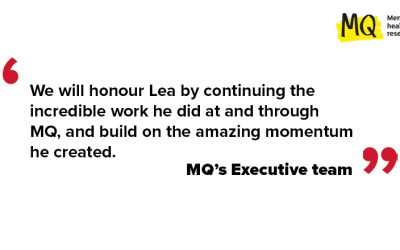Content warning: mentions of suicide
This blog was written by Moritz Herle, a lecturer in psychology at the Social, Genetic and Developmental Psychiatry Centre, Institute of Psychiatry, Psychology and Neuroscience, King’s College London, and newly an MQ Fellow. His research focuses on the development of eating behaviours, childhood weight and their impact on later health outcomes such as obesity and eating disorders.
What does it mean to have an eating disorder?
The term eating disorder is quite broad and includes different medical diagnoses. The most commonly known is anorexia nervosa, but others exist, such as bulimia nervosa and binge eating disorder. What it means to have an eating disorder will vastly differ from person to person. Generally speaking, all eating disorders include some disordered eating behaviours and a problematic relationship with one’s own body, which together have a detrimental effect on all aspects of life.
What are the common misconceptions about eating disorders?
Many still believe that eating disorders only affect girls and are just signs of someone asking for attention. This is untrue, and we know that eating disorders can affect everyone regardless of gender.
As this year’s Eating Disorder Awareness Week theme is eating disorders in men, what can we do to support more men?
I would say that we need to increase awareness that eating disorders can affect anyone, no matter their gender and will look very different for each individual. Some people still believe that someone with an eating disorder always is (or wants to be) very skinny. However, some research suggests that men might be more drawn to be excessively fit and grow muscles. This might lead to a sad situation where men who need support get overlooked.
What have you learnt from your research on eating disorders?
Over the past years, I have studied the development of eating disorders trying to understand why some children are more likely than others to develop an eating disorder in adolescence. There still is a lot to discover, but the picture is incredibly complex, suggesting various interacting risk factors, including genetics, metabolic, behavioural and socio-economic factors.
Why do you think people with eating disorders are at a higher risk of suicide?
This is an important question that we still don’t know the answer to. Some people believe that because eating disorders can sometimes be very severe and go on for a very long time that people feel so hopeless that suicide seems like a way out. Others suggest that some of the behaviours often part of having an eating disorder might be a type of self-harm that increases the risk for more self-harm and suicidal thoughts.
What are you hoping to discover or achieve through your research?
This research project will try to understand why eating disorders, self-harm and suicide often occur together. We will do this in two ways. First, we will invite people with lived experience of eating disorders – some will be current patients, some will have recovered – and interview them. We will ask about their self-harm experiences and how they relate to their eating disorder.
In addition, we will also invite clinicians who work with eating disorder patients to share their experiences and concerns around self-harm and suicide to get multiple perspectives on this sensitive topic. In the second part of the project, we will use information that has already been collected as part of other extensive research studies on eating disorders. These big projects involved sending questionnaires about self-harm, loneliness, and other important factors to thousands of people with lived experience of an eating disorder. We will use all this information to study the mechanisms linking these different behaviours. I hope this research will help us understand how, what, and when additional support would be the most useful.



